
Hope and Resilience: Young Australians' reflections on hope in a complex world
Considering the vital role of hope in sustaining and supporting young people’s mental health, wellbeing and resilience (Snyder et al., 2002; Valle, Huebner & Suldo, 2006; Gallagher & Lopez, 2009; Counted & Newheiser, 2024), it is critical to understand the influences that shape young Australians’ hopes and what actions can be taken to ensure younger generations remain hopeful, now and into the future. Bringing young people into the conversation about their futures will enable better understandings of their hopes and how they can be best supported to achieve them.

'Inoculations' against racist misinformation: an Australian online test
While online racism and online misinformation have clear connections, research in these two related areas have tended to remain separate. The current project begins to bridge this gap, by testing a new intervention approach to countering online misinformation that perpetuates racism. The study draws on both online misinformation studies and critical literacy perspectives, and generates new understandings of the effectiveness of existing interventions from these fields, for addressing racist misinformation.
Ultimately, the project findings indicate that in some cases, misinformation training may be more effective when it is contextualised within specific misinformation topics and narratives — including racist narratives. Significantly, this suggests that there may be important limitations to consider regarding ‘broad spectrum’ or generalisable approaches to ‘inoculation’ against misinformation.
Nida Denson, Alexandra Lee, Alanna Kamp, Fethi Mansouri, Amanuel Elias, Rachel Sharples, Oznur Sahin, Karen Connelly, Yin Paradies, Craig McGarty and Kevin Dunn

Anti-Women Attitudes and Extremism: Empirical Evidence from the Australian Context
In recent years, there has been a convergence of misogynistic attitudes and violent extremism both in Australia and abroad. From the ideological underpinnings of Islamist and far-right groups through to the rise of online male supremacist spaces now known as the ‘manosphere’, anti-women sentiments are increasingly serving as a catalyst within modern extremist movements. This has been seen in narratives of individuals belonging groups across a broad spectrum including Involuntary Celibates (Incels), the extreme--right, Christian nationalists, and Islamist jihadists, all of whom push for a return to traditional gender hierarchies that subjugate women and remove gender diversity.
This report responds to the growing acknowledgement both in academic literature in the social and behavioural sciences and within the Victorian policy landscape, that misogyny is not simply a social issue but a potential touch point into ideologically motivated violence.

Mapping Co-Design in CVE Initiatives in Victoria
Co-design is the most powerful approach available to government agencies that aim to create sustainable programs, policies, and services that genuinely reflect the needs and experiences of communities. This project explores how co-design is understood and practised between the Victorian State Government and multicultural communities—what enables it, what constrains it, and how current approaches can be strengthened to create more equitable, enduring, and community-led partnerships. Led by the Centre for Resilient and Inclusive Societies in partnership with the Australian Multicultural Foundation, the study focuses on the experiences of Community Support Groups funded by the Victorian Government. The study illustrates how co-design is experienced at the community level and how government can better support this work.
Trust emerged as central to effective co-design, but trust cannot be assumed. It can be built through long-term relationships, cultural responsiveness, and a genuine shift in power. The study’s findings show that co-design works best when communities lead, when trusted local organisations are resourced to act, and when governments commit to flexible, sustained partnerships. When co-design is rushed or controlled from outside communities, it risks reinforcing the very gaps it aims to close. To support better policy and program outcomes, especially in areas of social cohesion, P/CVE, and community resilience, government agencies can embed co-design and co-ownership together from the outset. This report includes a detailed Practice Guide and a case study to inform and support stronger partnerships between governments and communities.

Removing Barriers to Trust Building: Proposals to Rebuild Trust Between Governments and Communities
Trust is the glue that holds society together. The decline of trust in government and the institutions of civil society is one of the gravest issues facing Australia today. The decline of trust in civil society is linked to the rise of a widespread sense of grievance. One reason that this is so serious is that a feeling of grievance is one of the things that fuels extremism.
Governments cannot ignore this crisis. However, there are some actions they can take.
As this report shows, trust is built—or broken—through behaviour. To meet today’s challenges, we need practical, sustained efforts to embed trust building across government-community relationships. This report extends on findings from the 2024 Trust Flows project report. The findings from this study offer grounded, actionable strategies for rebuilding trust between governments and communities, recognising that trust is shaped not only by policy but by processes, consistent behaviours, reciprocity, and sustained relationships.
This report proposes four priority actions:
· Improve access to government systems by simplifying language and processes.
· Invest in community capability through support, governance training, and equitable access.
· Equip government officials with training to build and maintain trust with communities.
· Establish a Trust Lab to lead innovation and embed trust-building across institutions.
These actions are preventative, not reactive. Clearly, there are some external factors, such as international malevolent actors, that seek to undermine Australian society. However, governments in Australia should look to increase investments in social cohesion and institutional legitimacy at a time when both are under pressure.

Mapping far-right extremism intervention capacities in Victoria
While not a new phenomenon, Victoria has seen a resurgence of far-right activity both offline and in online space since the mid-2010s (Parliament of Victoria 2022). This has profoundly changed the landscape of violent extremism in the state and across Australia, as reflected in successive ASIO threat assessments (2021, 2022, 2023) that have highlighted a threat of violence from far-right violent extremist milieus. These changes have created new challenges for countering violent extremism (CVE) practitioners across government agencies, law enforcement, and intelligence agencies.
Against the backdrop of the rise of far-right extremism and a volatile and evolving threat scenario, this project examined current intervention infrastructure and programs for addressing radicalisation to far-right extremism in Victoria, the strengths of existing intervention capabilities, what gaps exist, and what improvements may be needed to strengthen Victoria’s capacity to prevent and intervene in far-right radicalisation pathways and trajectories.
The research presented in this report offers a review of current Victorian countering violent extremism (CVE) policy and programming, as well as a comprehensive literature review of far-right extremist intervention methods and radicalisation pathways. The empirical data collected for the study comprises 22 expert interviews with civil society and government stakeholders from Victoria, other parts of Australia and overseas. Based on this multi-method research, this report provides original insights into key features, strengths and gaps in Victoria’s current intervention capability in the context of far-right extremism. It also explores how these capabilities can be further developed and strengthened, for example by drawing on other national or international intervention approaches and tapping into community partnership opportunities.

Experience of Racism for Uber Riders and Drivers
This project investigates experiences of racism in Uber, among both riders anddrivers in Melbourne, Australia. The research was conducted between November2022 and February 2023, and consisted of two case studies: Case study 1 investigated racism in the experiences of Uber riders (passengers) using field testing methodology. It generated the first Australian data on differential outcomes for Uber riders across three ethnic groups: white Australian, East Asian Australian and African Australian. It also provided data on the geographic distribution of the rides based on the ethnicity of the riders. Case study 2 employed focus groups to investigate Uber drivers’ experiences ofracism. It explored migrant Uber drivers’ positive and negative experiences of driving, including experiences of racism, in another first for understandings of ridesharing and racism in Australia.
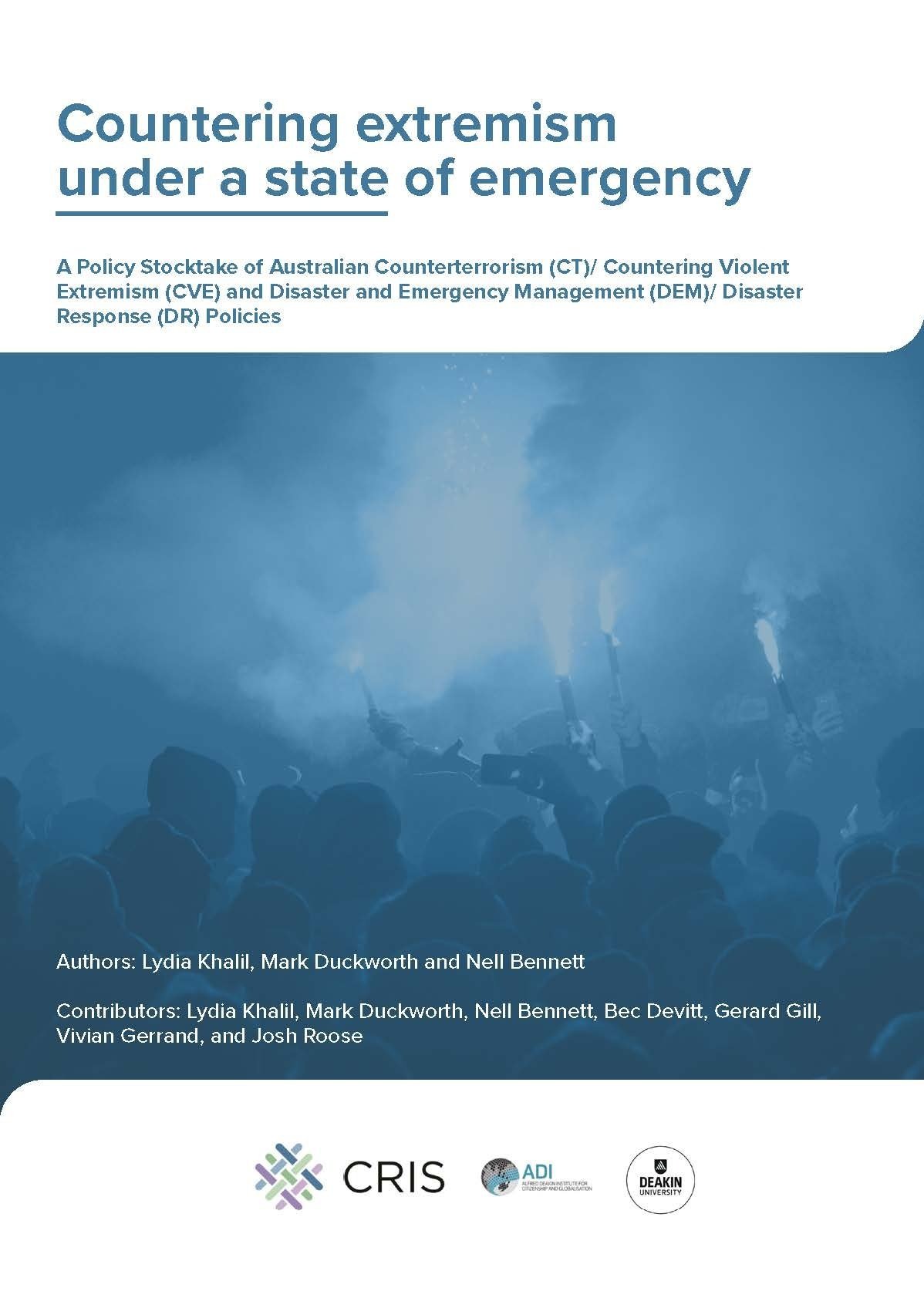
Crisis Points: Countering Extremism Under a State of Emergency
In Australia as elsewhere, violent extremist actors have exploited and instrumentalised a contested information environment during concurrent crises in 2020-2021 – including the COVID pandemic and natural disasters like the recent bushfires – to mobilise, plot and commit violent attacks, oppose government emergency responses and challenge or undermine social cohesion. Crises of this nature are likely to persist in one form or another; alongside evidence that natural disasters are on the rise (UN/CRED, 2020), there has been an equally unprecedented spread of misinformation and disinformation and contestation of the cause and origins of these crises (Cinelli, M., Quattrociocchi, W., Galeazzi, A., 2020) that will likely persist. Previous research findings have demonstrated that natural disasters like bushfires, hurricanes, earthquakes and pandemics have the potential to act as push factors to violence (Berrebi & Oswald, 2011; Fisher & Dugan, 2019; Kang and Skidmore 2018).
However, little is currently known about how natural disasters can impact violent extremism in the Australian context and in other high GDP countries. The relationship between the potential for conflict and natural disasters and emergencies is largely unaccounted for in disaster and emergency management (DEM) plans within advanced economies and consolidated democracies. Understanding exactly how natural disasters and emergencies can provide fodder for violent extremist groups and contribute to a mobilisation to violence will remain important into the future.

Do Governments Trust Communities? The Trust Flows Project Research Report
Around the world, governments in liberal democracies are increasingly worried by the decline of public trust. The question that is often asked is why individuals and communities have declining trust in government institutions. However, the reverse question – whether governments trust communities, and if not, why not – is far less frequently explored. A relationship of trust involves one party trusting another, and that trust being returned. One key quality of trust is therefore reciprocity. For a successful trust relationship to be created and maintained it must be reciprocal. Trust must flow both ways – not just from communities to government but from government to communities.
This Report examines trust relationships between government and communities that play a role in developing resilience to social harms. The particular focus is on the areas of disaster recovery, emergency response and dealing with violent extremism, and the ways in which government officials implement related programs and policies. The aim of the project is to support government officials and community leaders and members in creating and sustaining the trusting relationships that are needed to deliver these types of resilience building programs.

"We're bringing the party to them” A guide for organisations navigating digital participation of young people from refugee and migrant backgrounds
This guide provides knowledge and practical guidance to organisations, government, community and industry to inform and strengthen their support for YPRMB’s digital participation.

'Enhancing Digital Capacity amongst Refugee and Migrant Background Youth': Findings and Recommendations from a Review and Interviews with Youth-facing Organisations
This project investigated what helps and hinders the digital participation of young Victorians aged 15-24 from refugee and migrant backgrounds (YPRMBs), gathering perspectives from both young people themselves, and the communities and stakeholders supporting them. This report focuses on the perspectives of youth-serving organisations (including some youth and community-led initiatives).

'Enhancing Digital Capacity amongst Refugee and Migrant Background Youth': Findings and Recommendations from a Review and Focus Group with Parents and Leaders
This project investigated what helps and hinders the digital participation of young Victorians aged 15-24 from refugee and migrant backgrounds (YPRMBs), including the perspectives of parents and community leaders

Enhancing the Digital Lives of Refugee and Migrant Background Youth: Findings from interviews with young people
When given access to resources and support young people can rely on technology for work, education, socialising and health. For instance, technology enables online job interviews, virtual classrooms, connectivity to online support groups, and telehealth appointments. However, young people from refugee and migrant backgrounds have faced digital inclusion challenges, highlighted during the COVID-19 pandemic lockdowns.
This research investigated and identified the factors that can enhance digital participation amongst refugee and migrant background youth in Victoria, Australia. We have a diverse team of researchers and community partners collaborating with young people from refugee and migrant backgrounds, and together will propose strategies to enhance participation in the digital world.

DIGITAL FOR ALL: Understanding and Enhancing the Digital Lives of Refugee and Migrant Background Youth
When given access to resources and support young people can rely on technology for work, education, socialising and health. For instance, technology enables online job interviews, virtual classrooms, connectivity to online support groups, and telehealth appointments. However, young people from refugee and migrant backgrounds have faced digital inclusion challenges, highlighted during the COVID-19 pandemic lockdowns.
This research investigated and identified the factors that can enhance digital participation amongst refugee and migrant background youth in Victoria, Australia. We have a diverse team of researchers and community partners collaborating with young people from refugee and migrant backgrounds, and together will propose strategies to enhance participation in the digital world.

Enhancing Digital Participation Amongst Refugee and Migrant Background Youth Project: Key Findings and Recommendations for Policy and Practice
When given access to resources and support young people can rely on technology for work, education, socialising and health. For instance, technology enables online job interviews, virtual classrooms, connectivity to online support groups, and telehealth appointments. However, young people from refugee and migrant backgrounds have faced digital inclusion challenges, highlighted during the COVID-19 pandemic lockdowns.
This research investigated and identified the factors that can enhance digital participation amongst refugee and migrant background youth in Victoria, Australia. We have a diverse team of researchers and community partners collaborating with young people from refugee and migrant backgrounds, and together will propose strategies to enhance participation in the digital world.

Online and Offline Racism in Victoria
An analysis of Twitter content from Victoria in 2020 found low levels of racial vilification if Asians. This surprising low level of public online racism is consistent with reanalysis of survey data. Racism directed against Asian Australians and others is an ongoing source of harm. There is not, however, good reasons to believe that hatred of Asians was successfully mobilized and exacerbated in Victoria in 2020 by mass online means. Racism needs to be confronted wherever it occurs, but the uncritical acceptance of media narratives is unlikely to help the cause of confronting it.

Can Do Better: mapping ordinary anti-racism and pro-sociality in Victoria
The research addresses the relatively neglected subject of anti-racism in Australia. The research maps the frequencies and forms of everyday anti-racism and prosocial attitudes and interaction in Victoria; identifies the factors and social variations that underlie everyday action; and explores transversal enabler practices quantitatively, including their prevalence.
Kevin Dunn, Jehonathan Ben, Rachel Sharples, Nida Denson, Amanuel Elias, Fethi Mansouri, Craig McGarty, Yin Paradies, Oznur Sahin

'Enhancing Digital Capacity amongst Refugee and Migrant Background Youth'
This research report summarises the key findings from the VicHealth funded project: Enhancing Digital Participation amongst Refugee and Migrant Background Youth. It makes recommendations for action that can be taken by stakeholders to enhance digital participation amongst young people of refugee and migrant background in the domains of education, employment, health and wellbeing, and civic and social connection.
Anita Harris, Kim Lam, Amanda Third, Phillipa Colin, Sherene Idriss, Soo-Lin Quek, Edmee Kenny, Louisa Wellend, David Cao, Komal Grewal, Alexandra Lee, Michelle Lim, Hiruni Walimungie

Media reporting on far-right extremism in Australia: Between strategic silence and harmful amplification
This report was produced as part of the project ‘The role of mainstream media in the mobilisation of radical political movements’ funded through the Centre for Resilient and Inclusive Societies (CRIS). This paper aims to identify key journalistic challenges and discussing practical factors that media professionals are encouraged to consider when making a decision about whether to report about far-right incidents and, if so, how.
Mario Peucker

Pathways of Resilience to Violent Extremism (VE) in Indonesian Higher Education
This research report has been conducted by an NGO called Love Frankie and funded by USAID and contains insightful new research (English and Bahasa) from Love Frankie with USAID on Indonesian youth resilience to violent extremism featuring the BRAVE measure.
Michele Grossman (lead), Greg Barton, Dr Vivian Gerrand, and Michael Ungar (a CRIS Consortium partner).
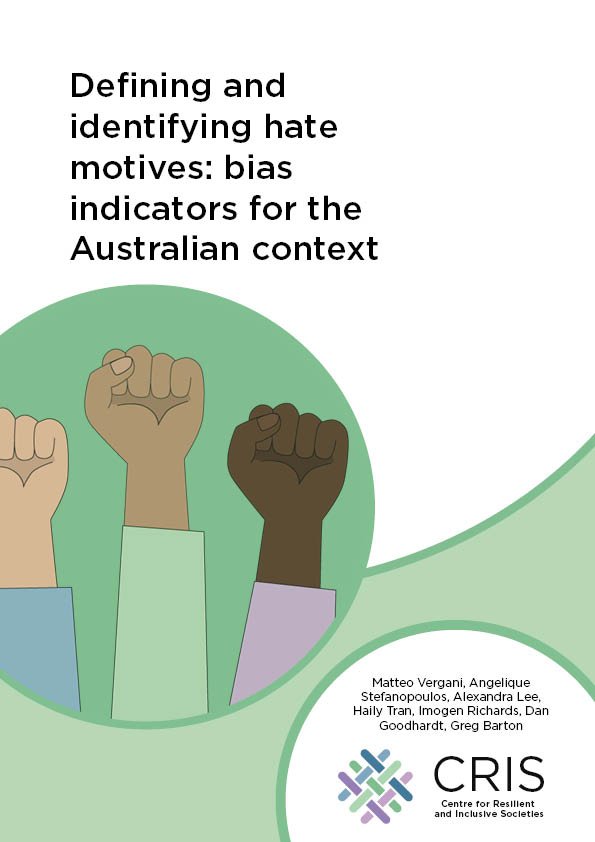
Defining and identifying hate motives: bias indicators for the Australian context
This report presents bias indicators for the Australian context and discusses their concept, uses, benefits and risks. The bias indicators we present are the result of extensive consultations with local experts including academics and practitioners working in law enforcement agencies, government and non-government organisations and community organisations. We aimed to make sure that the list would be practical and relevant to practitioners working in the fields of hate crime and hate speech.
Matteo Vergani, Angelique Stefanopoulos, Alexandra Lee, Haily Tran, Imogen Richards, Dan Goodhardt, Greg Barton

Australians’ Well-being and Resilience during COVID-19
This report presents findings of a national survey of over 1300 Australians conducted in November 2020 examining well-being and resilience within the COVID-19 pandemic context. The research project looked at the factors that promoted or hindered well-being and resilience during the pandemic, and what we can learn for future crises.
Nida Denson, Kevin Dunn, Jehonathan Ben, Alanna Kamp, Rachel Sharples, Daniel Pitman, Yin Paradies, Craig McGarty

Mainstream media use in far-right online ecosystems
Our research looked at the ways that far-right social media users use mainstream media outlets for their ideological messages. Researchers analysed over 55,000 social media posts from far-right users on Facebook and Gab, and found that all mainstream media outlets, regardless of their political leaning, can be co-opted for ideological messaging.
Mario Peucker, Thomas J. Fisher, Jacob Davey
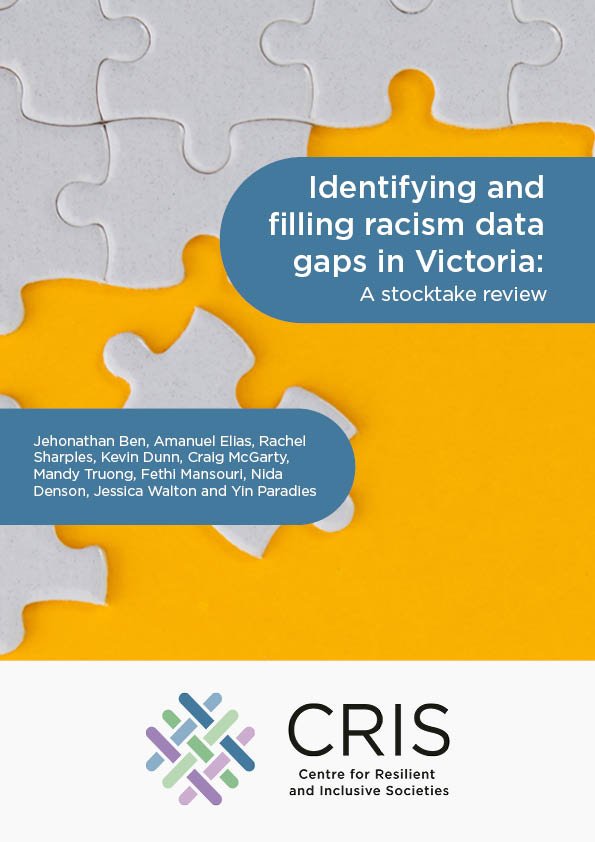
Identifying and filling racism data gaps in Victoria: A stocktake review
We report on a stocktake review of racism data collected nationally in Australia and with a specific focus on Victoria. We provide a comprehensive overview, summary and synthesis of quantitative data on racism, identify gaps in racism data collection, analysis and uses, and make recommendations on bridging those data gaps and informing anti-racism action and policy.
Jehonathan Ben, Amanuel Elias, Rachel Sharples, Kevin Dunn, Craig McGarty, Mandy Truong, Fethi Mansouri, Nida Denson, Jessica Walton and Yin Paradies

The Far-Left and Far-Right in Australia - Equivalent Threats? Key findings and Policy Implications
This briefing paper is the fourth and final output in ‘Symbiotic Radicalisation’, a project in our ‘Dynamics of Violent Extremism’ research stream. Symbiotic Radicalisation is a collaboration between researchers at the Institute for Strategic Dialogue (ISD) and the Institute for Sustainable Industries & Liveable Cities at Victoria University (VU). This paper provides an overview of key trends identified throughout this research program, which examines the online interplay between the far-left and far-right in Australia (with a focus on the State of Victoria) and considers the policy implications of this work.

Mapping young people’s social justice concerns: An exploration of voice and action
This report is the first phase of a two-phase action research project titled Building Activist Capacities of Young People Through Issue-based Campaigns.
The report explores key social issues facing young people aged 16 to 25 in Victoria, Australia, and examines how they respond to these issues. This study aims to better understand young people’s experiences of voice, the contexts and conditions in which they can cultivate their voices for social change, and where their voices resonate.
Read the summary and key findings here.
Alison Baker, Lutfiye Ali
This report has been designed using images from Freepik.com.

Reciprocal Dynamics Between Australia’s Political Fringes on Twitter
This paper is the third in a series analysing the interplay between far-right and far-left groups in the state of Victoria, Australia, across a range of social media platforms. It provides an analysis of over 400,000 tweets produced by a sample of 151 far-left and 75 far-right Australian Twitter accounts since 2016.
This paper was updated in March 2022.
Cécile Simmons, Joshua Farrell-Molloy, Jacob Davey, Mario Peucker

Asian Australians’ Experiences of Racism During the Covid-19 Pandemic
This report examines Asian Australians’ experiences of racism during the COVID-19 pandemic. Comprising over 2,000 participants, this is the largest empirical study to date of Asian Australian experiences of racism in the COVID-19 context.
This report was updated in March 2022.
Alanna Kamp, Nida Denson, Rosalie Atie, Kevin Dunn, Rachel Sharples, Matteo Vergani, Jessica Walton, Susan Sisko

A Snapshot of Far-Right Activity on Gab in Australia
This paper is the second in a series analysing the interplay between far-right and far-left groups in the state of Victoria, Australia, across a range of social media platforms. It provides an analysis of over 45,000 posts by a network of 40 active Gab accounts between January and September 2020.
Cécile Guerin, Jacob Davey, Dr Mario Peucker and Thomas J. Fisher
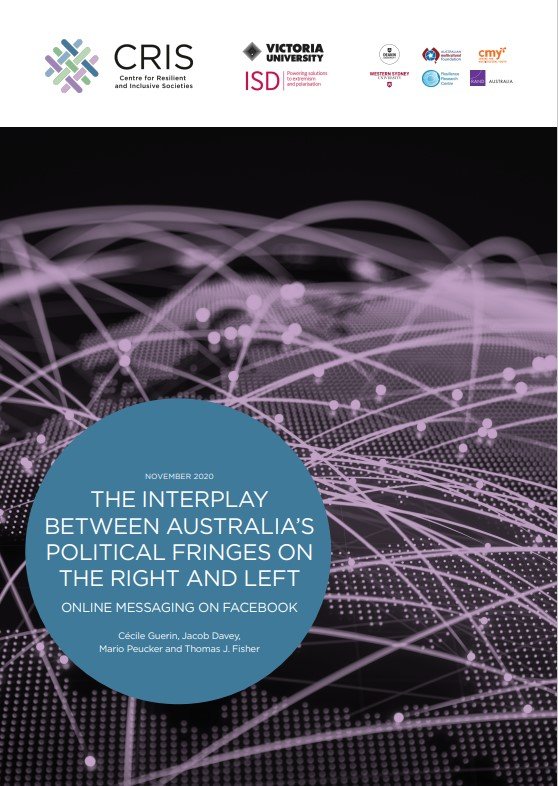
The Interplay Between Australia’s Political Fringes on the Right and Left - Online Messaging on Facebook
This paper is the first in a series analysing the interplay between far-right and far-left groups in the state of Victoria, Australia, across a range of social media platforms.
Cécile Guerin, Jacob Davey, Mario Peucker and Thomas J. Fisher
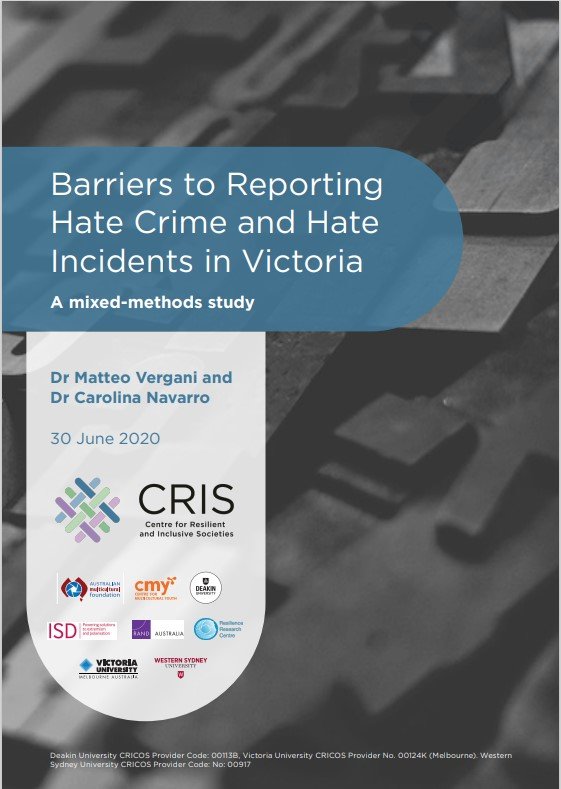
Barriers to Reporting Hate Crime and Hate Incidents in Victoria: A Mixed-Method Study
This report provides important evidence for all stakeholders involved in tackling hate in Victoria, including policy makers, law enforcement agencies and community organisations, to better understand how to address community reporting barriers.
Dr Matteo Vergani & Dr Carolina Navarro































